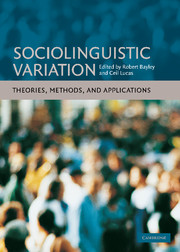Afterword: Walt Wolfram and the study of sociolinguistic variation
Published online by Cambridge University Press: 16 February 2010
Summary
I would imagine that the reason I was asked to write the epilogue to this book honoring Walt Wolfram is that I've known him longer, and in many ways better, than most others. Walt is indeed loved by his students and colleagues for his perpetually friendly ways, his unwillingness to surrender evidences of his working-class roots, his overpowering sense of fairness, his long-term efforts to bring about justice, his perpetual sense of humor, and, of course, for his brilliance in linguistics. Although this epilogue focuses on the development of his linguistic accomplishments, it also intends to try to show some endearing personal things about Walt that many may not know. If I am too personal, I beg his forgiveness in advance, but this is the Walt I know.
Our early relationship, soon to become a close friendship, began when he was an undergraduate student at Wheaton College from 1959 to 1963. Walt chose Wheaton over dozens of college offers and scholarships that came to him because of his outstanding athletic career at Philadelphia's Olney High School, where he starred in baseball, basketball, and football and received state-wide recognition and honor for his abilities. At Wheaton he continued with all three sports but he finally focused his athletic attention on football and baseball. Having watched him play basketball at Wheaton during his freshman year, it is not hard to understand why he narrowed down his options. It may be somewhat comforting to the rest of us to know that Walt wasn't always superior in everything.
Some may not know that Walt grew up in a conservative Christian faith, which became so strong for him that he planned to become a missionary.
- Type
- Chapter
- Information
- Sociolinguistic VariationTheories, Methods, and Applications, pp. 349 - 353Publisher: Cambridge University PressPrint publication year: 2007



